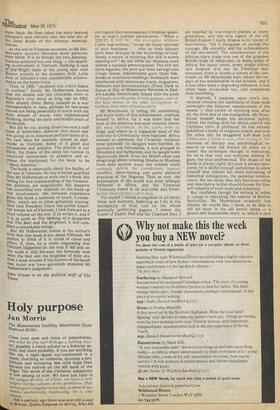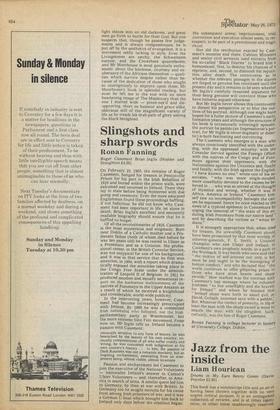Holy purpose
Jan Morris
The Missionaries Geoffrey Moorhouse (Eyre Methuen 0.95).
Close your eyes and think of missionaries, and what do you see? Perhaps a flaming miir-. tYr. Possibly a Jesuit scholar or a Saharan asCetic, but more probably, if you are anything lIke me, a tight-lipped non-conformist in a ,toPee, clutching an umbrella, intoning a pronibition and surveying less with hope than distaste the natives on the left bank of the Niger. The stock of the Christian missionary iS low among us now. We have lost faith in tne unique divinity of Christ; we have a new ,resPect for the cultures of the primitives. That ilrehetypal evangelist is not only in most of our Minds, aesthetically displeasing: he is also r Tn g ,5f let, a century ago there was scarcely a soul iihi2n Britain, Queen-Empress to skivvy, who did not regard the contemporary Christian apostles as man's noblest adventurers. "What a t_ will be," the evangelist William. Carey had written, "to see the many myriads of poor heathens . . . who by their labours have been brought to the knowledge of God. Surely a crown of rejoicing like this is worth aspiring to?" By the 1870s the Missions were almost a national preoccupation. The rich left them legacies, the poor put their savings into Congo boxes, industrialists gave them fishhooks or nutritious seedlings, bookstalls were smothered with missionary tracts, magazines, memoirs and reconstructions (From Dark to Dawn in Fiji, or Missionary Heroines in Eastern Lands). Inextricably linked with the pride of Empire was the pride of holy purpose, and all the best heroes of the time, Livingstone to Gordon, were men of famous piety
Mr Moorhouse, in telling the astonishing and ironic story of this achievement, confines himself to Africa, for it was there that the style of the missions was most assured, where the most charismatic of the saints were at large, and where as it happened most of the converts to Christianity were baptised. Africa seemed to represent the Christian vocation most precisely: its dangers were horrible, its ignorance was fathomless, it was plunged in bloodshed and barbarism, and its people were figuratively black. Even the British often had misgivings about weaning Hindus or Muslims from their ancient ways, but nobody could seriously defend the cannibalism, human sacrifice, slave-dealing and gross physical practices of the Negroes. Then as now, the polarisation of the world was most tellingly reflected in Africa, and the Victorian Christians heard in its war-cries and fetishhymns their their clearest call to duty. For myself I dislike evangelists of all faiths, times and manners, believing as I do in the multiplicity of God, and on the whole generally .preferring pagans. I detest the sound of Exeter Hall and the Clapham Sect, I am repelled by low-church pietists in every generation, and the only aspect of the old British Empire I really despise is its veneer of sanctimony. Yet '1 recognise of course the courage, the sincerity and the achievements of the movement. The extermination of the African slave trade was one of the grandest British feats of resolution; in many parts of Africa, for many years, every single school and hospital was run by Christian missionaries; there is hardly a corner of the continent, as Mr Moorhouse says, where the impact of the missionaries is not evident, and if it has often been a degrading influence, it has often been invaluable too, and sometimes even ennobling.
It depends, I suppose, upon one's convictions whether the usefulness of these ends outweighs the frequent repulsiveness of the means — that crown of rejoicing was, after all, the first aim of the evangelists. Mr Moorhouse himself keeps his emotions tightly reined. His feeling both for Africa and for the Christian ethic is profound: he has already published a study of religious orders, and only the other day he staggered half-dead into Timbuctoo, I think it was, after tryinl..1the interests of literary and psychological research to cross the Sahara all alone on a camel. His technique, though, is restrained, for he is that rare and welcome literary figure, the true professional. The shape of his books is always right; the pace is always measured; he is skilful enough sometimes to allow himself that riskiest but most enlivening of historical indulgences, the personal reminiscence. We are lucky that this fine story-teller and descriptive,writer should choose for himself subjects of such scale and solemnity.
But confident though his writing is, when it comes to educating the natives of Borrioboola-Gha, Mr Moorhouse evidently has doubts. He would like, I think, to be able to tell his story in the old heroic terms — a grand and honourable story, in which a new
light shines into an old darkness, and great men go forth to battle for their God. But one suspects that, though he passes few judgements and is always compassionate, he is put off by the aesthetics of evangelism. It is a movement oddly lacking in style. Even the Livingstones are tetchy, the Schweitzers narrow, and the Crowthers quarrelsome, and Mr Moorhouse is most genuinely enthusiastic about the kindness, courtesy and exuberance of the Africans themselves — qualities which survive despite rather than because of the dedication of those who sought so courageously to improve upon them. Mr Moorhouse's book is splendid reading, but even he left me in the end with no more heartening image of The Missionary than the one I started with — pince-nez'd and disapproving, short on humour and grace alike, oblivious still of the magnificent variety of life as he treads his drab path of glory among the black benighted.



































 Previous page
Previous page